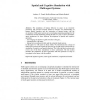Free Online Productivity Tools
i2Speak
i2Symbol
i2OCR
iTex2Img
iWeb2Print
iWeb2Shot
i2Type
iPdf2Split
iPdf2Merge
i2Bopomofo
i2Arabic
i2Style
i2Image
i2PDF
iLatex2Rtf
Sci2ools
117
click to vote
COSIT
2001
Springer
2001
Springer
Spatial and Cognitive Simulation with Multi-agent Systems
The simulation of human behavior in space is an extremely interesting and powerful research method to advance our understanding of human spatial cognition and the interaction of human beings with the environment. Multi-agent systems are an emerging computing paradigm for the construction of such simulations. During the last two years, we have used multiagent simulations for three different investigations of spatial and cognitive questions: - use of signage in airports to guide travelers to the gate, - communication with maps, - linkage between physical reality and the cadastral (legal) system. In this paper we will report on these efforts. We first discuss the concept of multi-agent systems and explain the special type of multi-agent system used for simulation of cognitive and spatial situations. The following three sections each review one of the three simulations we have constructed. The last section identifies the similarities in these approaches and lists questions we hope to inves...
Related Content
| Added | 28 Jul 2010 |
| Updated | 28 Jul 2010 |
| Type | Conference |
| Year | 2001 |
| Where | COSIT |
| Authors | Andrew U. Frank, Steffen Bittner, Martin Raubal |
Comments (0)

